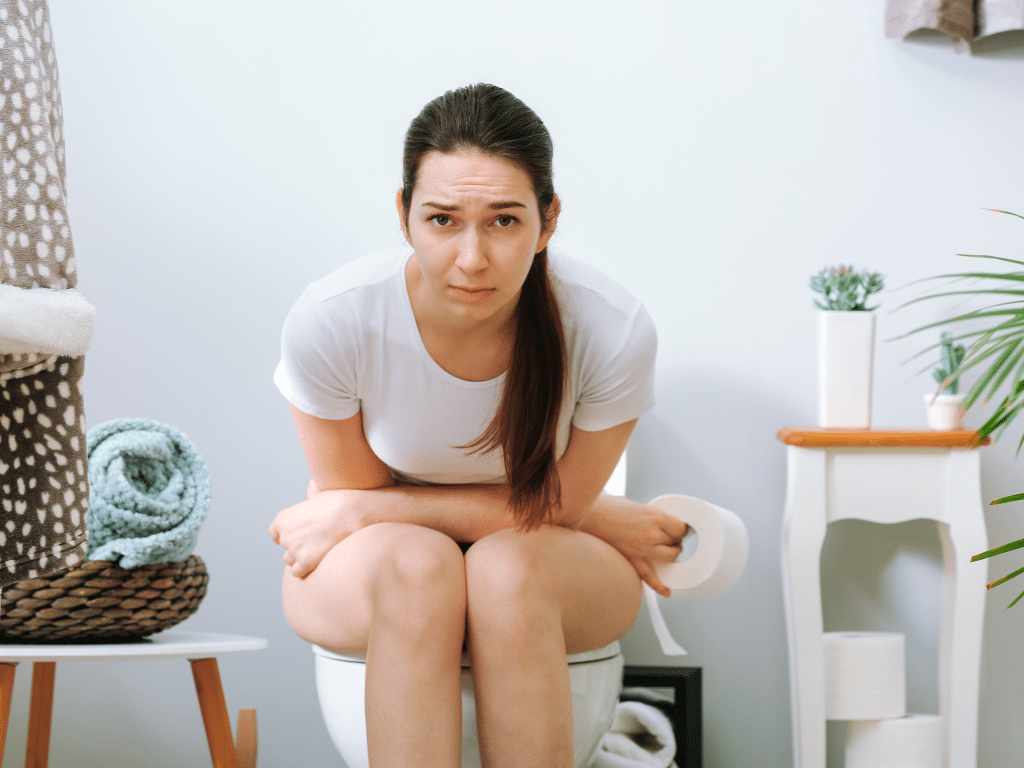What is Constipation?
Constipation is a condition where your bowel movements are occurring less often than normal and your stool or poop can be very hard.
The frequency of bowel movements is different for everybody: some individuals have a bowel movement once a week and some have them a couple of times a day. Going more than 3 days without having a bowel movement is considered unusual.
The longer you go between bowel movements, the harder the stool can get, which makes it harder to pass. You may be suffering from constipation if you are having too few bowel movements, you have to strain to pass stool during a bowel movement, your stools are hard or similar to small stones, you feel bloated or your belly is bloated.
How Common Is Constipation after Bariatric Surgery?
Not every bariatric surgery patient will experience constipation long term but many patients do experience mild short-term constipation issues. Post-bariatric surgery constipation can last from 4 to 6 months and most resolve without any medical intervention. Normally, these constipation issues can be attributed to the use of diuretics, not consuming enough water, and less fiber intake in the diet.
Experiencing bowel movements less frequently after weight loss surgery does not necessarily mean constipation. There have been many adjustments made to your digestive system affecting the way it works so it just might be a matter of adjusting to your “new” normal.
What Causes Irregular Bowel Movements after Bariatric Surgery?
Some people’s bathroom habits happen like clockwork. For instance, you may be one of the few who have a bowel movement every morning first thing, or you may be an individual who has a bowel movement every two days.
If you have undergone weight loss surgery, chances are that your bowel movements are going to be irregular for a while. Most types of weight loss surgery reduce the size of the stomach forcing dietary changes and some make changes to the digestive tract, which affect the way our bodies eliminate waste.
What Causes Constipation after Weight Loss Surgery?
The process of going through any surgical procedure can cause constipation. The use of general anesthesia during surgery or consuming certain pain medications can cause a temporary slowdown on the bowel highway. While this can be a bit uncomfortable for a few days, it is normally temporary and should resolve by itself.
Constipation after gastric sleeve surgery, gastric bypass or not being able to poop after bariatric surgery is a common problem that many patients experience. Depending on the type of weight loss surgery you had, your constipation may resolve itself quickly or linger for several months.
Reasons You May Have Problems Pooping After Bariatric Surgery
Surgical Alterations of the Digestive Tract
Alterations and rerouting of the digestive tracts caused by gastric sleeve or gastric bypass surgery can cause constipation. Reduced stomach size limits capacity and our bodies‘ ability to absorb fiber–rich foods.
Reduced Intake of Fiber
After bariatric surgery, your initial diet consists of liquids only, then pureed foods, and working up to solids. In addition, your objective after bariatric surgery is to consume lean protein first – before anything else – making it challenging to get in that much-needed fiber. Inadequate consumption of fiber will result in harder stools and make it harder for our bodies to eliminate them.
Muscle Weakness
Weak pelvic and abdominal muscles may be a result of prolonged obesity and can hinder bowel movements following bariatric surgery.
Dehydration
Due to the smaller stomach size after weight loss surgery, it is challenging to try to hit water consumption targets and remain hydrated. It is important to know that if we do not provide our body with enough water or liquid, it will take whatever moisture it can from our digestive tract to use in other vital areas. This results in hard stools and infrequent bowel movements. The American Society for Metabolic and Bariatric Surgery recommends increasing your water intake at the first sign of constipation to avoid other unpleasant side effects.
Use of Pain or Other Medications
Typically, the use of narcotic pain relievers during early recovery contributes to constipation. It is best to try to discontinue use as soon as you can avoid aggravating your bowels any further. They will get you back in the end! In addition, certain medications are also known to cause constipation such as antidepressants. If you were taking this medication and were experiencing constipation previous to surgery, your poop problems may become even more “crappy” so speak to your surgeon in advance for recommendations for keeping you regular.
Caffeine Intake
Consuming caffeine has different effects on different people. For some people, it stimulates bowel movements and can cause loose stools and for others, it can further aggravate constipation.
Consumption of Nutritional Supplements
Bariatric surgery patients need to take supplements for nutrients and vitamins they can‘t obtain from food. Some supplements may cause constipation, like iron. People may need to take stool softeners with iron to ease this.
What Problems Can Chronic Constipation Cause?
Sometimes constipation after weight loss surgery can cause problems such as hernias, or hemorrhoids. Other constipation consequences might include:
- Anal fissures – tears in the lining of your anus:
- Fecal impaction – poop gets backed up and blocked tight.
- Diverticulitis – an infection from blocked poop.
- Damage to the muscles in your pelvic floor from straining.
How Do I Know if My Post-Surgery Stool is Normal?
Often, after having a medical procedure or treatment, patients assume that what they are experiencing during recovery is normal. Since they do not know what the new “normal” is, they have no way to compare, causing needless suffering.
Knowing what to expect related to constipation after gastric bypass surgery or any bariatric surgery will help you prepare and avoid unpleasant side effects. Be consistent in communicating with your surgeon and ask questions. This will help you know whether what you are experiencing is normal or if you require medical intervention.
Possible constipation may occur after weight loss surgery due to the necessary dietary changes to accommodate the alterations of the digestive system.
Constipation After Gastric Sleeve
Although constipation after gastric sleeve surgery is not as common, it can still occur due to the limited stomach size and other post–operative dietary changes. Therefore, constipation is often caused by not taking enough fiber, insufficient water intake, and pain medications during recovery. However, incorporating more fiber into the diet and drinking water, may help to reduce the chances of constipation.
Your doctor may provide you with a prescription for medication that could alleviate and relieve your constipation, if, even after consuming the recommended amount of water a day and an adequate amount of fiber, you are still having difficulty.
What Helps Constipation after Gastric Sleeve?
The most natural way to avoid constipation is through prevention but in cases where it is not working, a fiber supplement that makes your stool softer and bulkier may help. This type of supplement does not stimulate your bowels like a laxative so it is a bit less intrusive.
Before using any treatments for constipation, your doctor can recommend a stool softener to help ease constipation after gastric sleeve surgery or any bariatric surgery. There are various over–the–counter treatments available.
Constipation After Gastric Bypass
Gastric bypass surgery reduces the stomach size and reroutes part of the small intestine, shortening the distance between where food enters and waste exits. As a result, constipation is expected to occur much like it does after gastric sleeve surgery.
Gastric bypass patients usually have more nutritional supplements or higher dosages which may contribute to the slowdown of the bowels. Maintaining a healthy diet of proteins, fiber, water, and supplements can help you have regular bowel movements.
Regardless of the type of weight loss surgery you had, be prepared for some less talked about side effects. You may experience more gas and occasional cramping and the smell and consistency of your poop may be very different.
If you had gastric bypass surgery, a portion of your small intestine has been rerouted and made shorter. Considering that your body doesn’t have as much time to process food. Your bowel movements may be runnier and they might smell worse than they did before. You might want to invest in a good air freshener.
How Often Should You Have a Bowel Movement After Gastric Bypass?
There is no set number of times a patient should poop after gastric sleeve or gastric bypass surgery. Each individual will be on their schedule just like they were previous to surgery. The key for each patient will be adjusting to their new “normal” lifestyle including their bathroom routines.
If patients begin to experience symptoms of constipation, despite following all recommendations, they should contact their doctor for assistance.
What Can Bariatric Patients Take for Constipation?
Eat more fiber, and take supplements to ease constipation associated with gastric sleeve or gastric bypass surgery. Prescription medications, over–the–counter laxatives, and drinkable fiber are also other options. Your surgeon can recommend the best relief based on your stage of recovery and the severity of constipation. Some common recommendations include:
- Get enough water – 64 oz a day of liquids.
- Incorporate the daily amount of recommended fiber into your diet or use fiber supplements:
- Avoid known constipation-causing foods like white bread, pasta, and rice.
- Use surgeon-approved over-the-counter laxatives when necessary. You do not want to use laxatives long-term as your body may grow dependent on them.
- Get nutrition advice from a bariatric expert on healthy eating, including fruits, veggies, oatmeal, lean proteins, and healthy fats.
- Increase your level of physical activity. Exercise helps get things moving.
How to Prevent Constipation after Weight Loss Surgery?
Constipation can affect anyone but when it occurs after bariatric surgery, it can especially be problematic. The digestive system is already in a delicate state and needs to heal.
The best thing to do is try to avoid the situation from the start. Drink plenty of fluids, exercise, and adhere to a dietary plan to fight constipation post–surgery.
IBI Healthcare Institute‘s team of experts would be delighted to answer your queries and talk about your weight loss options if you are interested in exploring bariatric weight–loss surgery further.









